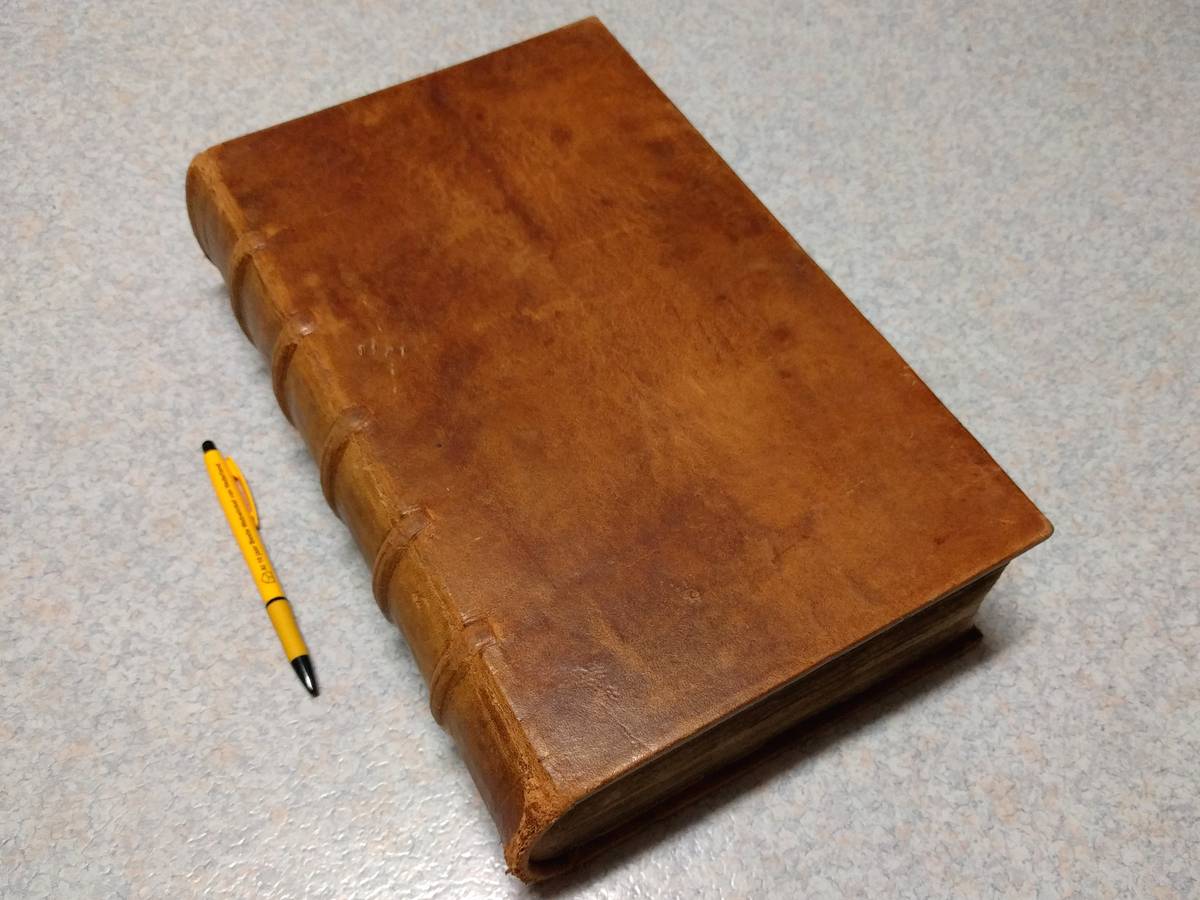HORATIUS.
Quincti Horatii Flacci Venusini, Poetae Lyrici elegantiss. Opera, grammaticorum XL tam antiquiss. quam neotericorum partim iustis commentariis, partim succinctis annotationibus, singulari studio & amplissimis sumptibus in unum Corpus collectis, illustrata, variisque ac vetustissimis exemplaribus collata, & menda in iisdem sublata, quorum Auth(orum) nomina & ordinem sequens pagina demonstrabit. Iam pridem, in studiosae iuventutis gratiam et utilitatem post Herculeos labores edita, cum gemino indice rerum, verborum ac sententiarum locupletissimo.
Basel (Basileae), Per Sebastianum Henricpetri, (1580).
Folio. (XXIV),(XXXVI),2280 columns, (12 index, and printer's mark at the end) p. 19th century full calf. 35 cm 'May be classed among the most excellent and rare' (
Ref: VD16 H 4874; Schweiger 2,398; Dibdin 2,94; Moss 2,12/13; Brunet 3,314/15: 'mérite certainement d'être distinguée'; Ebert 10159; Riedel Horatiana 51; USTC 689469) (
Details: Back with 5 raised bands. Gilt short title in second compartment. Sebastian Henripetrus' woodcut printer's mark on the title, depicting a rock on which a hand from heaven strikes fire with a hammer. The fire is aroused by a human head (a cloud?) blowing from the sky. The second printer's mark on the verso of the last leaf is a simpler version of the image, now with the addition of the name of the printer 'Sebastian Henric Petri'; the 2 letters 'n' in the name 'Sebastia
n He
nric Petri' are strange enough cut backwards mirrorwise. Woodcut initials. Printed in 2 columns. The poems of Horace, printed in a beautiful Roman letter, are surrounded by commentary, printed in italics, thus more or less suggesting the layout of a medieval manuscript) (
Condition: The foot of the spine is somewhat chafed. The front flyleaf is gone. Front inner hinge slightly cracking, but strong. Title a bit soiled. Old name on the title. Occasional yellowing paper. Occasional some faint and small waterstains. One larger waterstain in a few quires at the end of the book. Small wormhole in the blank right upper corner of some 80 leaves, not affecting text. A few spots on the lower board. The binder erroneously switched leaf Ee1 and Ee6) (
Note: The works of the Roman poet Quintus Horatius Flaccus, 65-8 B.C., have enjoyed a continuous presence in European culture. His memorable phrases made him the most quoted ancient author. Till well into the 20th century he stood central in school curricula. Earlier, in the Middle Ages, he was next to Vergil the most important school author. Horace is transmitted in around 300 medieval manuscripts. The Renaissance saw the beginning of a flood of editions. 'For Neo-latin poetry until modern times, and for all the vernacular literature of Europe from the 16th through the 18th centuries, Horace provided the dominant model both for private lyrics celebrating wine and love and for public lyrics celebrating affairs of state'. Young poets used Horace to learn the trade. 'Horace's elegant rationalism and moral wisdom, and also his disabused and tolerant tone, made his poems favorite reading during the Enlightenment'. (The Classical Tradition, Cambr. Mass., 2010, p. 454/60)
§ This edition of Horace is a kind of 'Variorum' edition. It offers the observations and emendations of 40 Horace scholars, old and new, including the commentaries of the scholiasts Helenius Acron and Porphyrius. It does not break new ground, Lambinus seems not to exist, but it is a real treasure chest for Horatian philology, supplying all what is worth knowing of Horace and his poetry. It is a reissue of the edition of 1555, which was produced by the German classical scholar Georg Fabricius, 1516-1571. 'Seine Ausgaben von Vergil, Horaz und Ovid zeichnen sich nicht nur durch philologische Akribie aus, sondern sind auch wegweisend für die Interpretation'. (NDB 4,734)
§ A remarkable feature of this edition is the space which is attributed to the Ars Poetica. Commentaries, treatises on the AP by Landinus, Luisinus, Grifolus Lucinianensis, Iason & Gabriel de Nores, Parrhasius, Amarbachius & Freigius, fill almost a quarter of the book. It is a pity that Robertello's work on the Ars Poetica was not included. Still this 1580 edition is declared to be indispensable by Dr. Harwood: 'This is the great treasure of learning bestowed on Horace. My learned and worthy friend Dr. Parr, one of the best classical scholars in this kingdom, many years ago informed me of the distinguished merit of this edition. It contains the observations and remarks on Horace, which were made by the great scholars of that illustrious age, the glorious age of the revival of literature, as well as the criticism of all the old commentators on Horace, Acron, Porphyrion &c'. (E. Harwood, 'A view of the various editions of the Greek & Roman classics', 4th ed., London, 1790, p. 221/222)) (
Provenance: Name on the title of 'R. Alberda'. This must be a 'Reynt Alberda', or a 'Reint' Alberda'. This christian name is the most frequently used name for men in the Alberda family of Northern Dutch gentry, so it is hard to say who this might be. The handwriting seems to be 18th century) (
Collation: *-2*6, a-c6, A-Z6, Aa-Zz6, AA-ZZ6, AAa-ZZz6, AAaa-DDdd6) (Photographs on request) (Heavy book, may require extra shipping costs)
Book number: 150251 Euro 775.00
Keywords: (Oude Druk), (Rare Books), Altertumswissenschaft, Dichtkunst, Fabritius, Georg Fabricius, Henricpetri, Henricus Petri, Horace, Horatius, Horaz, Latin literature, Poesie, Swiss imprints, antike altertum antiquity, classical philology, poetry, römische Literatur
 HORATIUS.
HORATIUS.